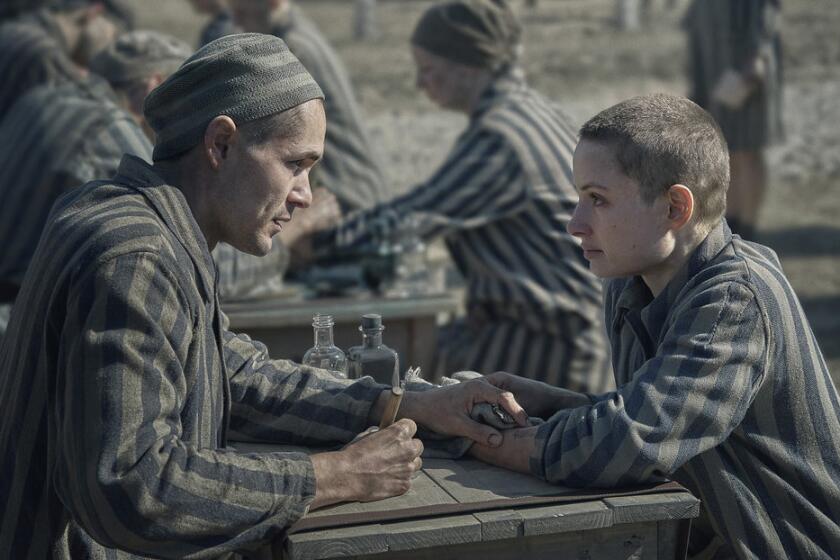Philosophy written in the stars
“But they’re both the real Kirk. It’s not that one is the impostor,” Arthur Lechtholz-Zey argues.
James Stramel disagrees. “I think that one of the reasons why the rational but weak and ineffectual Kirk is regarded as the real Kirk -- the good one -- is because the view of ‘Star Trek’ and the episode is that what is most definitive of the human personality is our reason,” he says.
An argument between a pair of Trekkies? A disagreement between sci-fi fanatics? No. This scene is from a recent class session of “Philosophy 41: The Philosophy of ‘Star Trek.’ ” Lechtholz-Zey is one of about 30 students taking in the new course at Santa Monica College; Stramel is one of two professors teaching the class; and, yes, that’s Captain Kirk they’re discussing.
The television classic has been praised, imitated, examined and parodied on television, in dormitories and living rooms for more than 35 years. Its very language has entered into the modern lexicon ever since William Shatner as Kirk commanded: “Beam me up, Scotty!” But the science fiction saga, though frequently cited in film, television and writing classes, is not the standard for the study of philosophy.
“ ‘Star Trek’ is intentionally philosophical,” the course’s other instructor, Amber Katherine, explains. Stramel finishes her thought: “Most people who watch it like the explosions and the crazy aliens, and that’s fine, but they’re being introduced to and being stimulated to think -- if only in a kind of fuzzy and inchoate way -- about various philosophical problems.
“In fact,” Stramel continues, “almost every episode is a morality play; they raise all kinds of topical issues.”
Students enrolled in the course are just as convinced of the validity of the study of philosophy through the “Star Trek” lens. “I’m actually a UCLA student,” Glennn Medrano admits, “but I’m enrolled here, because I’m very much interested in the things that ‘Star Trek’ offers -- it’s kind of like multidisciplinary; it has elements of sociology that I find interesting.”
Of course, not everyone on campus understands the concept. One of the fliers announcing the class that the professors had distributed throughout the campus came back to their lecture room on the first day of class with the header “Philosophy 41: The Philosophy of ‘Star Trek’ ” crossed out and tagged: “And also Philosophy 4: ‘Leave It to Beaver’: Back-to-Back Episodes Every Night.”
Stramel dismisses the resistance to the idea of a class focused on a popular show by pointing out “we are going to be exploring the philosophy of the show in order to teach philosophy through an interesting and popular medium.” In essence, the original series and all of its spinoffs, as well as the “Star Trek” movies, become the text for the class.
“We’re trying to give students some critical thinking skills,” Katherine says. “That will enable them to read the text of television in a way that’s as sophisticated as they might read a literary text.” Screenings are supplemented with readings from books, including “Star Trek: The Human Frontier,” by Michele Barrett and Duncan Barrett.
Allegories in space
The establishment of the class doesn’t surprise Rick Berman, producer of “Star Trek: Nemesis,” the latest film that opened Friday. “It’s not surprising that teachers from grammar school to graduate school try to in some way incorporate the issues that are explored in ‘Star Trek’ and also the reason for why it’s been so popular for so long -- from the original series to our movie ‘Star Trek.’
“Voyager,” “Deep Space Nine” and “Enterprise” are “thoroughly postmodern ,” Katherine says. “Where the original ‘Star Trek’ and ‘The Next Generation’ series examined societal issues in simple allegories that were, in effect, morality plays, the later shows do not.
“They pick and choose and they paste together in this acontextual and ahistorical way a text that alludes to a lot of the issues in our culture,” Katherine continues. Do the producers and writers, consciously lay out philosophical mazes? “Star Trek” creator Gene Roddenberry created the show during the Cold War and wanted to present uplifting themes, Berman says. From the maiden television voyage of the Enterprise in 1966 on, there was a conscious effort to address contemporary sociopolitical issues.
“We have an episode coming up on ‘Enterprise’ that deals in a very abstract fashion -- as science fiction tends to do well, through metaphor as opposed to hitting it right on the head -- with the stigma against people with HIV and AIDS,” Berman says”But when we do movies the major purpose is to entertain,” he says. “John Logan, the writer of our most recent movie, ‘Nemesis,’ has combined both emotional and intellectual into the themes in the story, but it’s always got to be mixed in with something that is action-packed, funny and epic.”
Epic proportions notwithstanding, one of the story lines in “Nemesis” very nearly parallels a vintage “Star Trek” television episode, “The Enemy Within,” which by coincidence was the episode chosen for screening at a recent night’s class. The story revolves around Kirk, split in two, rendering a weak and indecisive person and an aggressive, belligerent, combative person -- neither suitable to command a starship. “That’s exactly what we’re doing with this movie, in terms of Captain Picard [played by Patrick Stewart in the TV series “Star Trek: The Next Generation” and subsequent “Star Trek” films] facing himself and Data [the android lieutenant commander played by Brent Spiner in the same series and films] likewise facing himself.”
In the Santa Monica College classroom, the concept of “facing oneself” is taken even further. “The concept that to be human is to be a rational, unified self is challenged after ‘The Next Generation.’ In other words, the modern concept of the self is replaced by the postmodern concept that says, in effect, that to be human is to be ambiguous and fluid,” Katherine concludes.
Moviegoers may come out of the theater admiring the special effects, but the would-be “Star Trek” philosophers will debate whether “Nemesis” is returning to Roddenberry’s views or howAristotle or Plato would have assessed variations in the modern and postmodern ethos of fictional starship captains Kirk and Picard’s responses.
More to Read
The biggest entertainment stories
Get our big stories about Hollywood, film, television, music, arts, culture and more right in your inbox as soon as they publish.
You may occasionally receive promotional content from the Los Angeles Times.






